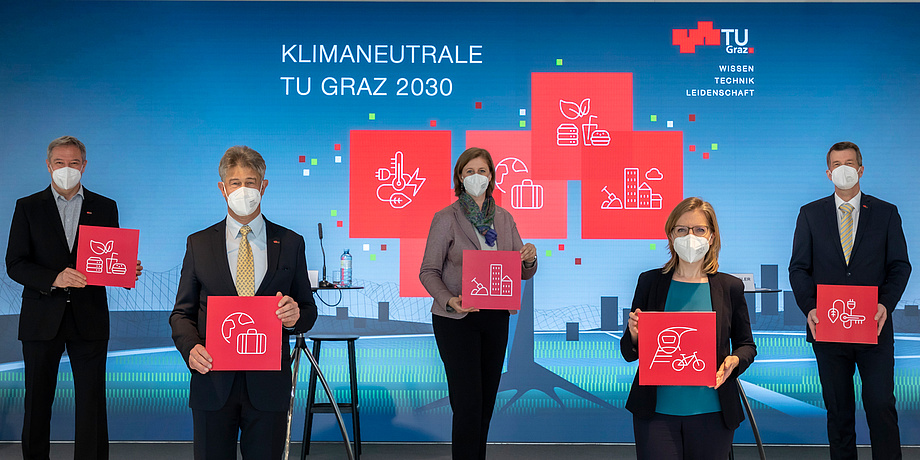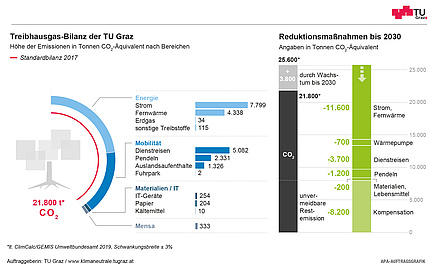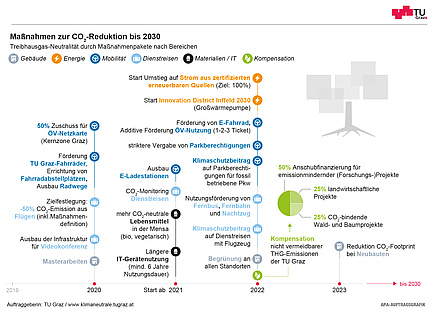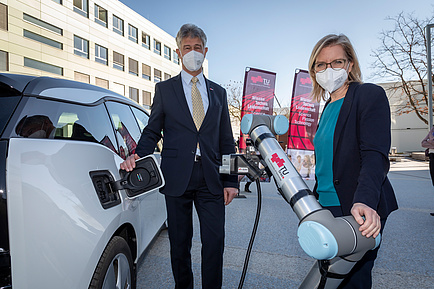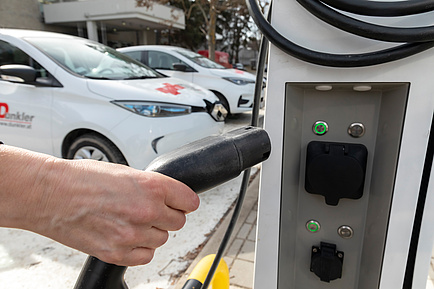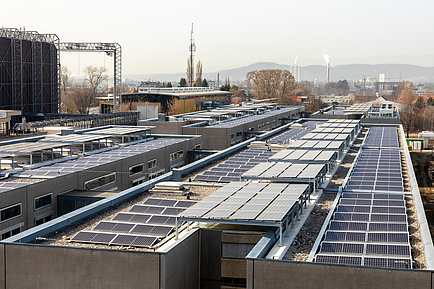Additional Images for download at the end of the text
The strategy was presented today in the presence of Leonore Gewessler, federal minister for climate action and Barbara Eibinger-Miedl, state minister for research.
Achieving "climate neutrality in Austria by 2040" as anchored in the government programme requires the active participation of everyone in Austria. With a view to the social role model effect of educational institutions, Graz University of Technology is pursuing an ambitious roadmap for achieving the climate targets – with very concrete measures, with substantial investments and with the assistance of all staff and students. With the programme "Climate-Neutral TU Graz 2030", TU Graz is one of the pioneers among Austria's universities and, based on current calculations, will invest around 11 million euros in this ambitious goal by 2030.
Working together for climate neutrality in Austria
At today's press conference, climate action minister Leonore Gewessler was delighted about the ambitious climate protection activities and measures of TU Graz and once again emphasized the need to achieve climate targets and the important role that Austria's universities play in this: "The climate crisis is the great issue of our time and it affects us all. On the road to a climate-friendly future, we need the full toolbox. Research and educational institutions can make a significant contribution to this: with climate protection measures within the organization and with research and technology development against climate change and its effects. I am extremely pleased that Graz University of Technology is setting a good example here, taking important steps against climate change, and acting as a role model for its students."
"The green deal and digitalization are the two big issues of the future. In both areas, TU Graz is already a leader in Austria. And it is once again underlining this position with its ambitious action plan on the road to climate neutrality. An essential key to achieving climate goals is research and technology. Styria is making an important contribution to climate and environmental protection here with 14 of Austria's 18 environmental technology competence centres, the green tech cluster, numerous innovative companies and the core research areas of our universities," says provincial minister Barbara Eibinger-Miedl.
Greenhouse gas balance as a starting point
The basis for the roadmap is a fully comprehensive greenhouse gas (GHG) balance of TU Graz, from the university infrastructure to the mobility behaviour of all employees. According to this, the total emissions of Graz University of Technology for the year 2017 amounted to just under 22,000 tCO2 equivalents. According to the GHG balance, electricity accounts for the largest share of total emissions at just under 8,000 tCO2e, followed by business travel by the approximately 3,600 employees at around 5,100 tCO2e, the planned new buildings at 5,000 tCO2e and the heat supply at just over 4,000 tCO2e per year.
Reduction measures until 2030
TU Graz wants to reduce these GHG emissions drastically within the next decade. Harald Kainz, Rector of TU Graz and driving force behind "Climate-Neutral TU Graz 2030": "As focal points of progress and innovation, universities have a very special role to play in climate protection. At TU Graz, we have dedicated one of our five Fields of Expertise entirely to 'Sustainable Systems'. The best minds deal with future-oriented urban planning, sustainable construction, renewable energy sources, intelligent energy networks and green mobility, and teach our students the use and further development of these climate-friendly technologies. With our roadmap to a climate-neutral university, we want to go one step further and set a good example: With the help of our employees and students, we will neutralize our university’s CO2 emissions by 2030."
Intelligent bundle of measures for success
In energy management, TU Graz focuses on energy savings by increasing efficiency and on the production of green energy on- and off-campus. For example, roof areas at Campus Inffeldgasse are being equipped with photovoltaic systems on a large scale and participation in external PV systems and wind farms is being examined. In addition, Graz University of Technology is gradually – and from 2025 onwards exclusively – procuring electricity from 100 percent certified renewable and regional sources. Heat pumps and geothermal energy storage systems are used in new buildings, and the use of waste heat, for example from large computer systems, is being optimized. With these measures alone, TU Graz achieves an emission reduction of over 12,000 tCO2e per year.
For new buildings, Graz University of Technology, in cooperation with Bundesimmobiliengesellschaft BIG (the public-sector property management company), is focusing on the climate-optimized construction of sustainable university buildings based on the position paper of the Alliance of Sustainable Universities in Austria. This provides for the integration of sustainability and climate neutrality right from the start of university construction projects, for example, as well as a life-cycle assessment and the climate-optimizing renovation of existing buildings. Greening measures at all TU Graz campus locations complete the plans.
The award-winning mobility management of TU Graz, which is based on the promotion of cycling and public transport, is being further promoted and the incentives for switching to soft forms of mobility are being further increased. Already, a record-breaking 40 percent of all employees at TU Graz ride their bikes to work. In the future, the TU Graz bicycle campaign will be expanded to include the promotion of e-bikes, the expansion of the bicycle path network around the campus will be promoted together with the City of Graz, and additional covered bicycle parking facilities will be built at all campus locations. For electric cars, more than 200 e-charging stations will be installed on campus and the e-car sharing service will be further expanded. The use of public transport by TU Graz employees – in particular the planned 1-2-3 ticket – will be subsidized additively from 2022. In the future, parking permits for the three campus locations will be issued according to tougher guidelines – except for social reasons – and a climate protection fee will be charged for parking fossil-fuelled vehicles. With these measures alone, TU Graz will achieve an emission reduction of over 1,200 tCO2e per year.
According to the motto "Stay grounded, but keep connected", a cultural change at TU Graz is aimed at further reducing the number of business trips. Employees will be able to call up their individual carbon footprint via their own monitoring tool, and wherever it makes sense and is possible, video conferences will replace business trips. The use of long-distance buses, trains and overnight trains will be promoted over short- and medium-haul flights, and a climate protection charge will be introduced on air travel. The goal is to reduce CO2 emissions caused by air travel of TU Graz employees on business trips by 50 percent and save 3,700 tCO2e per year.
Compensation of unavoidable GHG emissions
This leaves about one-third, or 8,000 tCO2e per year, of unavoidable GHG emissions. TU Graz provides compensation models for this purpose. These range from start-up funding for emission-reducing research projects to projects to sequester CO2 from the atmosphere.
Acting sustainably and researching sustainable systems
In the Field of Expertise "Sustainable Systems", which encompasses all TU Graz research disciplines, TU Graz faces the complex challenges of climate change and conducts interdisciplinary research across faculty boundaries to find sustainable solutions. This extends to research into societal and ecological impacts in the Science, Technology and Society Unit at Graz University of Technology.
Emission reductions in the mobility and building sectors are of immanent importance for achieving the climate targets. TU Graz is devoting itself to these central topics in two new research centres, as Horst Bischof, Vice Rector for Research at TU Graz, explains: "We are now combining our many years of expertise in hydrogen research – keyword HyCentA – together with industry to form an independent Hydrogen Research Center and create a hotspot that is visible throughout Europe. We are following the same approach in the Sustainable Construction and Climate Protection Research Center, where we take a transdisciplinary approach to optimizing the sustainability of the built environment."
In total, 83 national and international research projects with a total volume of approximately 13 million euros were running at TU Graz in 2020, dealing with the topics of sustainability and climate protection. With the "Climate-Neutral TU Graz 2030" programme, the commitment is now also visible and tangible on an institutional level.
